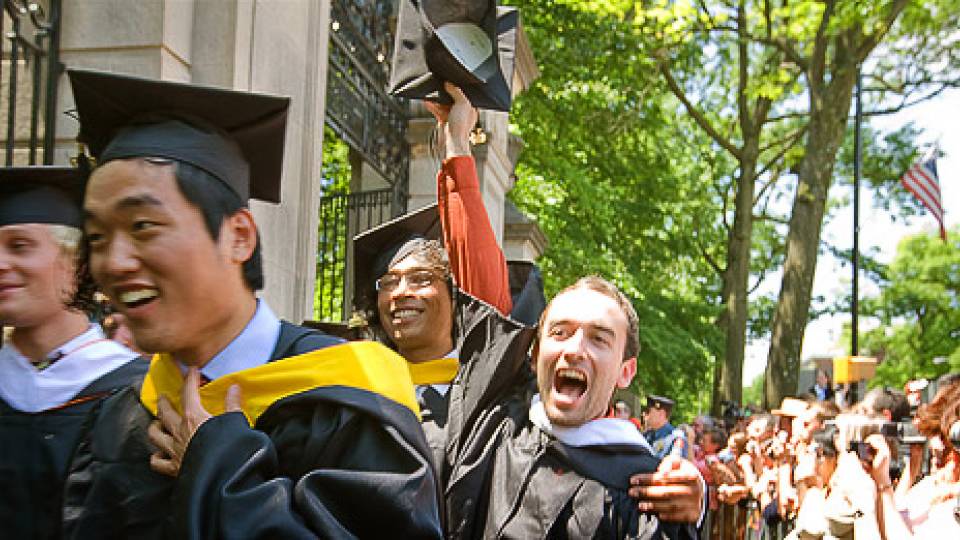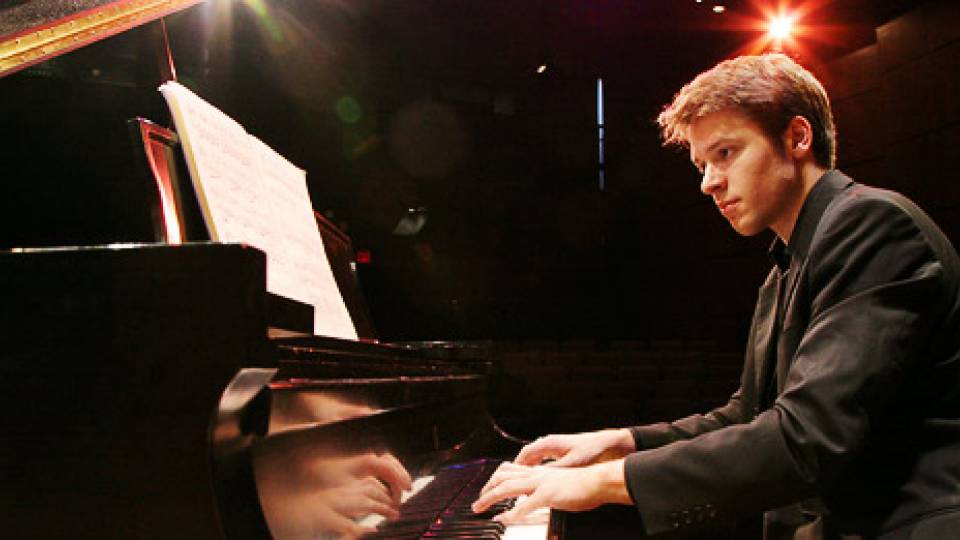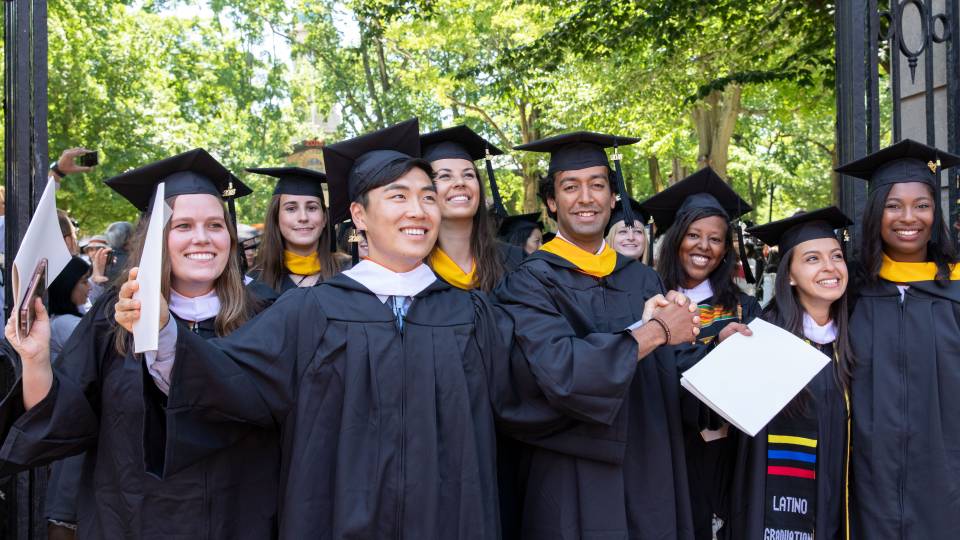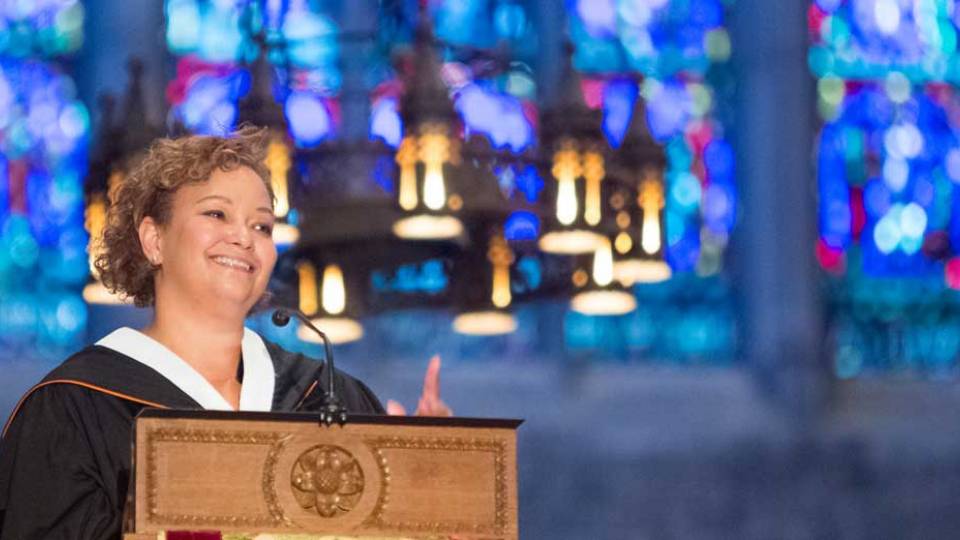Delivered by Holger Staude
Commencement
June 2, 2009
Princeton University Class of 2009
Thank you, President Tilghman, for giving me the opportunity to speak to my classmates today. Transitions can be unpredictable. It can be difficult to leave behind the places and the people we know and daunting to think about what's coming next. So I can't help asking myself if today -- Commencement -- is a happy day.
Leaving FitzRandolph Gate is fundamentally an expedition into uncharted territory. And no, this one won't be like Outdoor Action, although graduation may feel to us like the beginning of a trip into the wilderness. Two years ago, a friend and I departed for a six-week hike across the uninhabited tundra of Iceland. We had prepared the hike for several months, developing maps, researching satellite images and entering waypoints into our handheld GPS units. And yet, many questions remained as we boarded the plane headed to Iceland's capital, Reykjavik. What if magnetic fields distorted the compass along the way? What if clouds and fog impaired the GPS units? What if geothermal activity had changed the location of rivers and streams?
Just like my friend and I prepared for Iceland, we have all, during the past four years, prepared for life beyond FitzRandolph Gate. Today, we may know how to calculate the duration of a five-year inflation protected treasury security; we may master the tactics we learned in that Woodrow Wilson School seminar on negotiation theory or the molecular simulation methods we studied for that unpassable chemical engineering final. And yet, with all that knowledge, a horde of challenges will inevitably beset the paths each of us commences now. Indeed, it will be difficult to leave what is so familiar to us today and put all that scholarship to the test tomorrow. So I have to ask again: Should today be a happy day?
Perhaps it shouldn't. After all, there are many things that we are going to miss about Princeton. All-nighters with friends at your side, waiting in line behind someone printing out 500 pages at a cluster the moment before your paper is due, delighting in the wondrous culinary offerings of our beloved Wawa, and certainly enjoying the fine, limitless and, most importantly, complimentary beverages at your favorite eating club on the Straβe [Street]. But for everything we leave behind, there is much that we take with us as we walk through FitzRandolph Gate.
The first, and perhaps the most important, is our ability and our willingness to ask questions. What we don't ask, we'll never know. Good answers are preceded by good questions, and sometimes conceiving the right questions is harder than arriving at the right answers. After four years at Princeton, we all know how to find a five-paragraph textbook answer to almost any question, just as my friend and I both knew how to read the compass for our trek across Iceland. However, in Iceland, knowing how to read the compass wasn't enough to find our way since the magnetic north -- the direction in which the compass points -- isn't necessarily equal to the true north -- the direction toward the geographic North Pole. The angle between the magnetic north and the geographic north varied as our journey through Iceland continued. As a result, my friend and I found it necessary to recalibrate the compass every day.
Just as finding true north requires constant calibration of the compass, finding "true happiness" may require periodic "calibration" of our inner compass to guide our interpretation of knowledge and our actions. Being inquisitive and capable of positing the right questions will take us a long way. If nothing else, our four years at Princeton have given us the courage to approach the world as a big question -- not only in our professional roles as academics, doctors, lawyers and -- God forbid -- investment bankers, but also in our private lives, as thoughtful individuals and citizens.
Let us not be afraid of asking the same question twice. Consider Albert Einstein's response to a student who pointed out that the questions on a final exam were exactly the same questions as those on last year's exam. "That's true," Einstein responded, "the questions are the same, but the answers this year are different."
The second thing I believe we should all take away from Princeton is a healthy dose of skepticism -- not cynicism or distrust, but a wary eye toward the assumptions underlying our everyday interactions and the status quo. Asking the right questions is only part of the job; we also have to make sure that the answers we receive are adequate. Let me provide an example. Until recently, the status quo in economics was to model people as rational economic agents who maximize their lifetime happiness subject to a set of resource constraints. Not too long ago, psychologists including Princeton professor Daniel Kahneman had the audacity to suggest that economic agents may not be rational after all. People may be prone to make mistakes in a manner that is systematic and predictable and yet is not accounted for in standard economic frameworks. This skepticism toward the "rational economic agent" has created the field of behavioral economics and has earned Kahneman (a psychologist by training) the Nobel Prize in economics. Behavioral research has led to a richer and more realistic understanding of the way in which we make decisions. For example, introducing a person's tendency to follow the herd into a model of security prices may help us understand the occurrence of stock market bubbles (obviously, we haven't yet figured out how to prevent them, but rest assured that we're working on it).
I believe that asking the right questions and being somewhat careful about the answers we receive will help us whether we're trying to make a case in the boardroom or at a nightclub. Our graduation today initiates a stream of social, intellectual and hopefully monetary dividends. While you may lose your job, your car, your house and everything you own, your ability to ask the questions and subject the answers to a healthy dose of skepticism is yours to keep for life.
My family's experience has, more than anything, impressed upon me that the acquisition of knowledge is a preserving pursuit. In 1980, my mother and father crossed the barrier of concrete and ideas that had been erected between East Germany and West Germany. They did so illegally, escaping from a restrictive life hindered by the ubiquitous infiltrations of the East German police state. They lived a life without freedom of political, intellectual and artistic expression. When my parents departed from their hometown in East Germany, they left everything behind: their family, their career, their home and their possessions. The one thing that they were able to hold on to was the training they had received at university. They carried that education in their minds as they travelled to the West on a circuitous journey that brought them to Frankfurt by way of the Congo River. It was academics that ultimately enabled them to find work as high-school teachers, and to find their own true north in western Germany.
So while there are many things we leave behind at Princeton, the things we get to take away should make today a happy day. But you might disagree. Indeed, if you're French you may say that "partir c'est mourir un peu" (to leave is like dying a little). That said, your farewell from this university need not be permanent. In fact, one of the great supporters of international students at Princeton, Shelby M.C. Davis, likes to say that life is lived in thirds: learn, earn and return. I agree with Mr. Davis, but I hope that the thirds of our life are not mutually exclusive. In fact, I believe that learning is a lifelong pursuit -- an endeavor that will guide us as we earn, in all respects, and give back to our broader society and to Old Nassau. And while it may take some time for most of us to return to the University financially (we are in a recession, after all), I know that all of us will return physically, as classmates and as friends. Congratulations to the great class of 2009.
Your true north is waiting.



